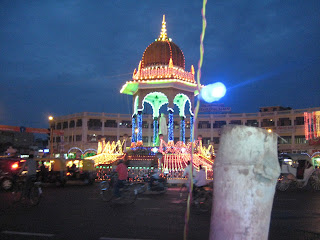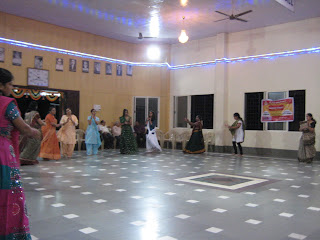Outdated post no. 2: October 2nd was Gandhi's birthday or "Gandhi Jayanti" which was celebrated at our organization with speeches, singing, clearing weeds and planting trees.
Speech by University of Mysore Professor on "Gandhism and the evils of globalization of material goods"
Picking rocks or weeds out of the soil
In Mysore, I'm working with a Cornell professor on a maternal/fetal nutrition study. Here, we are collaborating with the Swami Vivekananda Youth Movement. This organization was started by Dr. R Balasubramaniam, a truly inspirational person, in the 1980s. It started as a rural hospital that provided care to tribal and non-tribal populations and has expanded into a Development Leadership Masters program (the students in the picture above), a grassroots research organization (GRAAM), a palliative care program, and more. I'm working directly with the research organization.

The creative thinking and sharing of information never ends at this organization (sometimes at the expense of getting work done). A sociology PhD and host for the night reads us poetry written to her by her husband. Although I understood maybe 10%, but better than the 0% when I started here!
Anyway back to Gandhism, a term that has come to mean many things, many things that are often not practiced. In the context of economics, a true "Gandhi-ist" believes in 'simple living' and 'self-reliance'. While India was able to break free from the British Empire and maintain some degree of self-sufficiency, I wonder if even Gandhi could have taken on the next big invaders: Walmart and Starbucks.
A few weeks after I got to India, the Prime Minister, Manmohan Singh, increased foreign direct investment (FDI) to 51% in multi-brand retail and 100% in single-brand retail. This means that when Walmarts start opening (already one wholesale store), the company will own 51% of the store and profits while for stores like Starbucks or IKEA, the company will own 100% of the store/profits.
The government has high hopes for FDI. The commerce minister quoted that companies like Walmart will be integral in the “creation of an infrastructure, an integrated food chain, bringing in the newest technology." The food distribution system in India is inefficient and lots of food from small farms and other producers rots before it gets to consumers. Walmart will buy directly from farmers, helping farmers while cutting out middlemen and wasted produce. The reality--Walmart will probably buy from farmers that are already doing well and own large amounts of land. Either way, the small farmer may turn into the farm-hand/agricultural employee in the not too distant future. Something needs to be done to make the food system in India more efficient. I'm not so sure the answer is foreign direct investment (FDI). However, the answer of non-corrupt, efficient government may never exist in India (or many places in the world).
At any rate, political groups were not too happy with this increase in FDI so the BJP, a party that advocates self-reliance, called for a nationwide "bandh." Basically, during a bandh, which translates to 'closed', the city shuts down and there is no transportation...no buses, no trains, no cars, and almost no motorcycles (most popular form of transportation). Even major cities like Bangalore completely shutdown. Bus drivers who choose to drive are either threatened or end up with slashed tires or vandalized buses. Not quite the non-violent protest.
Actually, one of my co-workers asked, "In NYC, do they have protests? What do people do when they protest?"
My answer: "They camp out in a park?"
I just can't imagine a protest about anything in the US completely shutting down a city, at least not since the Rodney King riots.
Reflecting on Occupy Wall Street protests this past year, I realize, perhaps we're all protesting the same thing. It's the 99% protesting against that 1% except in this case the 1% is us, the US, our companies (not just Wall Street). Should we be protesting with the world and give up shopping at Walmart? Not likely.
I've come to learn that "bandhs" are a frequent way of protesting in India. Next post will be part 2: Karnataka bandh for water security.
For now, my own protests remain small scale. This week, I refuse to eat white rice three times a day.
BTW--for those following up on the Nobel prizes awarded last week-I never realized Gandhi never won the Nobel Peace Prize. He was nominated 5 times (1937/1938/1939/1947/and finally Jan 1948-only a few days before he was assassinated). Since the Nobel Peace Prize isn't given posthumously (except one exception), that year the prize was awarded to no one as "there was no suitable living candidate" according to the Committee.
ALSO--The word Gandhism is probably something Gandhi would have hated.




























